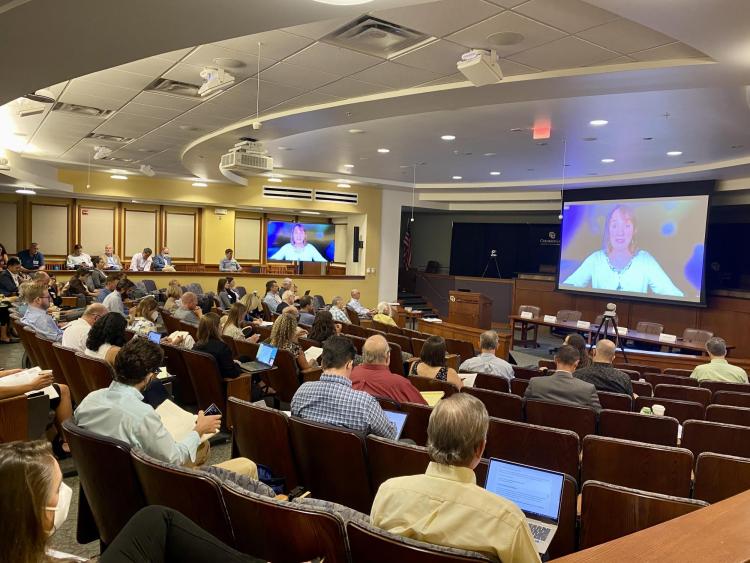The hosted it’s 42nd Annual Conference on Natural Resources on Thursday, June 16 and Friday, June 17, 2022. The event, titled “2026 May Be Too Late: Hard Conversations About Really Complicated Issues” brought together a broad array of experts and diverse perspectives from across the region to candidly discuss the demand for water across the Colorado River Basin and the rapidly diminishing supply.
Chronic drought, record heat, increasing winds and aridity, as well as rampant wildfires are diminishing the Basin’s overall health and resilience. To ensure a sustainable future, these harsh realities will require inclusive collaborations and innovative actions—and with this conference, the GWC aimed to do its part. Thought leaders in the fields of natural resources law and policy attended the conference to take part in a conversation about advancing sustainable water management, expanding basin-wide conservation, and strengthening watershed resilience.

The first day of the conference focused on understanding where we currently stand, confronting what we don’t know, and making sense of projections for the future. After an introduction and welcome from Dean and Deputy Director of the GWC, , the day’s sessions began.
James Prairie, Upper Colorado Basin Research and Modeling Group Chief with the Bureau of Reclamation, kicked off the conference reviewing what climate scientists believe will be the likely behavior in the Colorado River Basin system in the near-term. Jeff Lukas of Lukas Climate Research and Consulting then summarized what the Climate Science foresees for the region in future decades. Tanya Trujillo, the Assistant Secretary for Water and Science with U.S. Department of the Interior provided a highly anticipated presentation on the status and timeline of negotiations for the 2026 guidelines.
Thursday’s programming continued with a moderated discussion on the unanswered legal issues at play. John Fleck, writer in residence at the Utton Center at the University of New Mexico School of Law, served as moderator. The day closed with a final session during which Professor Brad Udall discussed characteristics in the Basin across a range of flow scenarios.
“In the esteemed 42-year history of the Colorado Law Conference on Natural Resources, there may never have been a timelier or more salient set of issues addressed. What happens next will have far reaching implications not only for the Colorado River Compact, but for agriculture, energy development, and Tribal rights throughout the West,” noted Director LaBarre.
Read the conference .
On Friday, the conference invited perspectives from across the Basin to share ideas, best practices, and lesson learned, including viewpoints from “Next Generation Voices”. In a session titled “Crafting a Rural-Tribal-Urban Social Compact in a Warming World,” experts addressed a wide-ranging set of opportunities for the Basin, including anti-speculation measures and innovative agricultural conservation methods, utility level conservation and planning, and the role traditional Tribal methods could play in Basin-wide resiliency.
The conference closed with hosts John Fleck, retired GWC Western Water Policy Program Director, Doug Kenny, and Water Journalist, Luke Runyon moderating the next generation of water policy leaders through a discussion around their vision and hopes for the future of the Colorado River.
“The Getches-Wilkinson Center has been fighting the good fight at Colorado Law for decades. It is among the oldest and most established centers of its kind in the country,” reflected Dean Inniss. “We are extraordinarily proud of how the GWC continues to advance scholarship and advocacy that aims to solve what many consider the most pressing issues of our lifetime.”
.
“We are very fortunate at the GWC to have these experts give so freely of their time and join us each year to provide their knowledge and perspectives on the developments within the Basin,” added LaBarre. “It is through the support of our speakers and sponsors that the Conference on Natural Resources has remained a relevant, signature event of Colorado Law for generations.”

